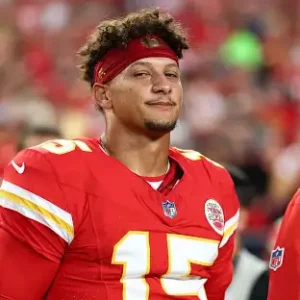In recent weeks, the intersection of sports and politics has once again made headlines, particularly with respect to Kansas City Chiefs quarterback Patrick Mahomes. Despite receiving praise from former President Donald Trump, Mahomes has made it clear that he intends to keep his political preferences private as the 2024 presidential election approaches. This decision underscores a broader trend among athletes who choose to maintain a neutral stance in political matters.
Patrick Mahomes, known for his impressive skills on the football field and his charismatic presence off it, has been a prominent figure in American sports. As a Super Bowl MVP and one of the most recognizable athletes in the NFL, Mahomes’s opinions and endorsements can significantly influence public perception. However, despite the growing trend of public figures, including athletes, becoming increasingly vocal about political issues, Mahomes has opted for a different path.

Recently, Donald Trump publicly praised Mahomes and his wife, Brittany, which stirred speculation about whether the quarterback might publicly endorse Trump or align himself with his political views. This praise, while flattering, is not unexpected given Mahomes’s high profile. However, Mahomes’s response to this attention has been a clear statement of intent: he will not use his platform to endorse any political candidate.
Mahomes’s decision reflects a broader trend among athletes who are choosing to separate their professional lives from political endorsements. This trend is not without precedent. Many athletes, particularly those with significant public followings, have historically opted to stay apolitical, focusing instead on their sports careers and personal endeavors. The rationale behind this choice often involves a desire to avoid alienating fans who may have diverse political views and to prevent their sports careers from being overshadowed by political controversies.
For Mahomes, maintaining a neutral stance helps preserve his focus on football and his philanthropic work. His public persona has largely been shaped by his achievements on the field, his leadership qualities, and his community engagement. By avoiding political endorsements, he ensures that his public image remains centered on these aspects rather than becoming entangled in the contentious and polarized world of politics.
Moreover, Mahomes’s approach aligns with the principle that sports figures should have the freedom to express themselves in ways that are true to their values while choosing how to engage with political issues. This decision is particularly relevant in an era where athletes are increasingly involved in social justice causes and political discourse. By choosing not to endorse any candidate, Mahomes emphasizes his desire to focus on his role as a sportsman and community leader rather than as a political commentator.
In summary, Patrick Mahomes’s choice to remain apolitical, despite receiving praise from Donald Trump, is a deliberate decision that highlights his commitment to keeping his professional and personal lives separate from political endorsements. This stance allows him to maintain his focus on football and his charitable efforts while avoiding the potential pitfalls of political involvement. As the 2024 election approaches, Mahomes’s decision serves as a reminder of the diverse ways in which public figures navigate the intersection of their professional success and personal beliefs.









